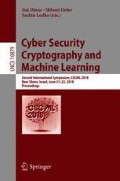Abstract
Byzantine Fault Tolerant (BFT) replication leverages highly available cloud services and can facilitate the implementation of distributed ledgers, e.g., the blockchain. Systems providing BFT State Machine Replication (SMR) work under severe system assumptions, for example, that less than a third of replicas may suffer a Byzantine failure. Infrequent arbitrary violations of such design assumptions, may lead the system to an unintended state, and render it unavailable thereafter, requiring human intervention. Self-stabilization is a highly desirable system property that can complement Byzantine fault tolerant systems, and allow them to both tolerate Byzantine-failures and automatically recovery from any unintended state that assumption violations may lead to.
This paper contributes the first self-stabilizing State Machine Replication service that is based on failure detectors. We suggest an implementable self-stabilizing failure detector to monitor both responsiveness and the replication progress. We thus encapsulate weaker synchronization guarantees than the previous self-stabilizing BFT SMR solution. We follow the seminal paper by Castro and Liskov of Practical Byzantine Fault Tolerance and focus on the self-stabilizing perspective. This work can aid towards building distributed blockchain system infrastructure enhanced with the self-stabilization design criteria.
A technical report of this work appears on https://arxiv.org/.
S. Dolev—Partially supported by the Rita Altura Trust Chair in Computer Sciences; the Lynne and William Frankel Center for Computer Science; the Ministry of Foreign Affairs, Italy; the grant from the Ministry of Science, Technology and Space, Israel, and the National Science Council (NSC) of Taiwan; the Ministry of Science, Technology and Space, Infrastructure Research in the Field of Advanced Computing and Cyber Security; and the Israel National Cyber Bureau.
I. Marcoullis—Partially supported by a Doctoral Scholarship program of the University of Cyprus.
Access this chapter
Tax calculation will be finalised at checkout
Purchases are for personal use only
Notes
- 1.
A 64-bit counter incremented per nanosecond, can last for 500 years (virtually an infinity).
References
Abraham, I., Malkhi, D.: The blockchain consensus layer and BFT. Bull. EATCS 3(123), 74–95 (2017)
Baldoni, R., Hélary, J., Raynal, M., Tanguy, L.: Consensus in Byzantine asynchronous systems. J. Discrete Algorithms 1(2), 185–210 (2003)
Beauquier, J., Kekkonen-Moneta, S.: Fault-tolerance and self-stabilization: impossibility results and solutions using self-stabilizing failure detectors. Int. J. Syst. Sci. 28(11), 1177–1187 (1997)
Binun, A., Coupaye, T., Dolev, S., Kassi-Lahlou, M., Lacoste, M., Palesandro, A., Yagel, R., Yankulin, L.: Self-stabilizing Byzantine-tolerant distributed replicated state machine. In: Bonakdarpour, B., Petit, F. (eds.) SSS 2016. LNCS, vol. 10083, pp. 36–53. Springer, Cham (2016). https://doi.org/10.1007/978-3-319-49259-9_4
Blanchard, P., Dolev, S., Beauquier, J., Delaët, S.: Practically self-stabilizing Paxos replicated state-machine. In: Noubir, G., Raynal, M. (eds.) NETYS 2014. LNCS, vol. 8593, pp. 99–121. Springer, Cham (2014). https://doi.org/10.1007/978-3-319-09581-3_8
Castro, M., Liskov, B.: Practical Byzantine fault tolerance. In: Proceedings of the OSDI 1999, pp. 173–186 (1999)
Dolev, S.: Self-stabilization. The MIT Press, Cambridge (2000)
Dolev, S., Eldefrawy, K., Garay, J., Kumaramangalam, M.V., Ostrovsky, R., Yung, M.: Brief announcement: secure self-stabilizing computation. In: Proceedings of the PODC 2017, pp. 415–417 (2017)
Dolev, S., Hanemann, A., Schiller, E.M., Sharma, S.: Self-stabilizing end-to-end communication in (bounded capacity, omitting, duplicating and non-FIFO) dynamic networks. In: Richa, A.W., Scheideler, C. (eds.) SSS 2012. LNCS, vol. 7596, pp. 133–147. Springer, Heidelberg (2012). https://doi.org/10.1007/978-3-642-33536-5_14
Dolev, S., Welch, J.L.: Self-stabilizing clock synchronization in the presence of Byzantine faults. J. ACM 51(5), 780–799 (2004)
Doudou, A., Garbinato, B., Guerraoui, R., Schiper, A.: Muteness failure detectors: specification and implementation. In: Hlavička, J., Maehle, E., Pataricza, A. (eds.) EDCC 1999. LNCS, vol. 1667, pp. 71–87. Springer, Heidelberg (1999). https://doi.org/10.1007/3-540-48254-7_7
Fischer, M.J., Lynch, N.A., Paterson, M.S.: Impossibility of distributed consensus with one faulty process. J. ACM 32(2), 374–382 (1985)
Lamport, L.: Time, clocks, and the ordering of events in a distributed system. Commun. ACM 21(7), 558–565 (1978)
Lamport, L., Shostak, R., Pease, M.: The Byzantine generals problem. ACM Trans. Program. Lang. Syst. 4(3), 382–401 (1982)
Mostéfaoui, A., Mourgaya, E., Raynal, M.: Asynchronous implementation of failure detectors. In: Proceedings of DSN 2003, pp. 351–360 (2003)
Author information
Authors and Affiliations
Corresponding author
Editor information
Editors and Affiliations
Rights and permissions
Copyright information
© 2018 Springer International Publishing AG, part of Springer Nature
About this paper
Cite this paper
Dolev, S., Georgiou, C., Marcoullis, I., Schiller, E.M. (2018). Self-stabilizing Byzantine Tolerant Replicated State Machine Based on Failure Detectors. In: Dinur, I., Dolev, S., Lodha, S. (eds) Cyber Security Cryptography and Machine Learning. CSCML 2018. Lecture Notes in Computer Science(), vol 10879. Springer, Cham. https://doi.org/10.1007/978-3-319-94147-9_7
Download citation
DOI: https://doi.org/10.1007/978-3-319-94147-9_7
Published:
Publisher Name: Springer, Cham
Print ISBN: 978-3-319-94146-2
Online ISBN: 978-3-319-94147-9
eBook Packages: Computer ScienceComputer Science (R0)

